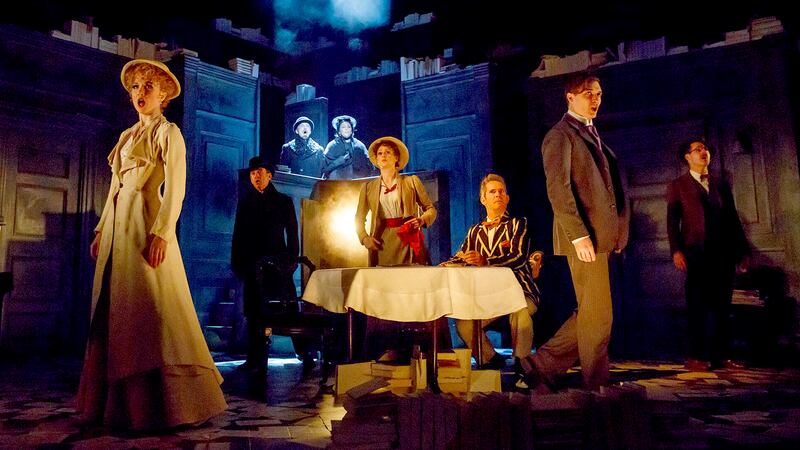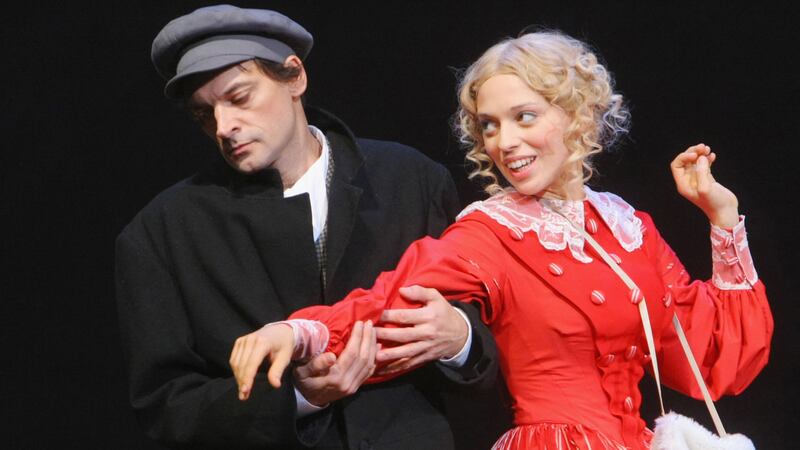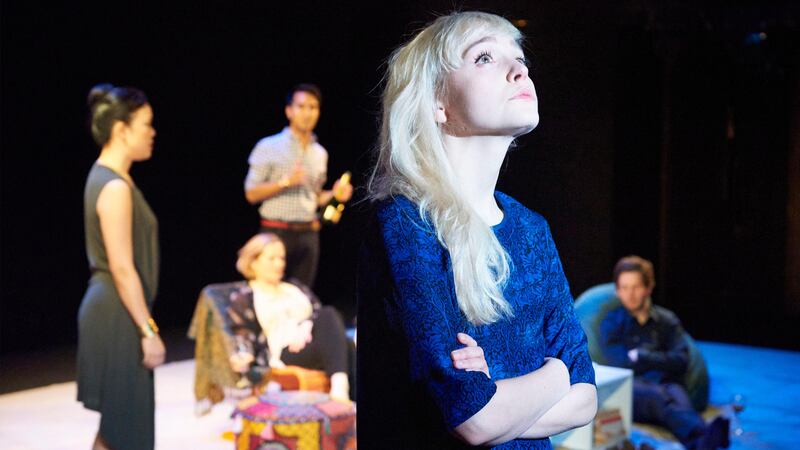Name me another dramatist who has the chutzpah to open a play with a chanteuse breaking down in tears as she sings “Shine on Harvest Moon,” striptease by a girl hanging from a chandelier, then some dogged acrobatics by philosophers doubling as gymnasts, one of whom is shot dead as they pile into a human pyramid.
You can’t. I can’t. But that’s how Tom Stoppard opened his Jumpers in 1972—and all with the improbable aim of asking if there was such a thing as an absolute, God-given morality, or if human values were simply a matter of expediency.
Two years later he produced an equally bizarre, equally bold example of what he called the Theatre of Audacity in Travesties, which is now previewing at the American Airlines Theatre in New York City in a new Roundabout Theatre production.
The setting for Travesties, which won the Tony Award for Best Play in 1976, is Zurich in 1917. Discovering that a minor consular official called Henry Carr sued James Joyce for the cost of a pair of pants he wore in the Irish writer’s production of Oscar Wilde’s The Importance of Being Earnest, and finding that both Lenin and the Dadaist Tristan Tzara were in Zurich the same year, Stoppard brought all four characters onstage.

Roudabout Theatre Company presents ‘Travesties.’ Pictured (L to R): Scarlett Strallen, Patrick Kerr, Dan Butler, Opal Alladin, Sara Topham, Tom Hollander, Seth Numrich, and Peter McDonald.
Joan MarcusThere were jokes, songs, limericks, yet more striptease, parodies of Wilde and a political homily, this time with the aim of discussing the place of the artist in society.
Well, Stoppard has calmed down since the 1970s. The Theater of Audacity has gradually morphed into the Theatre of Gentle Astonishment. But his aim as a dramatist, to “achieve the perfect marriage between ideas and high comedy”, has remained the same.
Plays like Arcadia in 1993 and The Invention of Love in 1997 have placed him at the head of British drama’s top table. Is there a more sharp-witted yet large-minded playwright living than the 80-year-old Stoppard? Surely not.
He was born Tomás Straüssler in Czechoslovakia, son of a Jewish doctor who fled the Nazis to Singapore where he was killed by the invading Japanese. Even though his mother then married a British soldier called Stoppard, and the family relocated to England in 1946, you can still detect a slight Czech accent in the voice of a man who, paradoxically, brings incomparable finesse to the use of the English language.
At school he shone at cricket, though hardly enough to turn professional, and recently described himself as “a cricketing failure who drifted into showbusiness.”
Still more paradoxically, he’s the most intellectual of British dramatists yet he never went to university. Instead, he became a journalist and aspiring novelist who decided in 1956, when John Osborne’s Look Back in Anger revivified a comatose British theatre, that drama was “the place to be at.”
In 1966 his play Rosencrantz and Guildenstern Are Dead was staged in a student production on the fringe of the Edinburgh Festival, got spotted by an influential critic, and within a year entered the repertoire of the National Theater.
That play is often revived, recently with Daniel Radcliffe as one of the two attendant lords desperately attempting to understand the threatening events unfolding in Hamlet’s Elsinore.
That gave Stoppard a theme which was to become familiar in the years ahead. Somewhere beyond the fun and the laughter there’s a baffling, chilling, even brutal universe.
“We move idly towards eternity, without possibility of reprieve or hope of an explanation,” says Guildenstern: a thought echoed in Arcadia, which ends with one of the play’s two most attractive characters dead and the other a crazed hermit, pondering the end of the world. For Stoppard, the persistence with which we try and fail to make sense of the world is what gives our species its value.
In the past critics have made two main objections to Stoppard’s work. One is that it lacks emotion. If it has a heart it’s one that pumps a sort of icy adrenaline instead of blood. And, yes, he himself concedes that this is true of his early plays.
However, The Real Thing, which appeared in 1982, provided a riposte to that. Stoppard being Stoppard, plenty of questions about sex and love are articulately raised. But it’s clear that the “real thing” can hurt, hurt horribly. “Please, please, please don’t,” cry stricken characters when they learn that they are being sexually betrayed. And the conclusion? That love is actually “mess, tears, self-abasement, loss of self-respect, nakedness.”
Again, there are moments in The Invention of Love that aren’t witty, funny or clever at all. “I would have died for you but I never had the luck,” cries the gay poet A.E. Housman, who has spent his adult life haplessly in love with his straight friend, Moses Jackson.
Stoppard once said he was a “repressed exhibitionist,” so embarrassed by passion and pain that he tended to hide them behind displays of theatrical fireworks. “But as I get older,” he said recently, “I’m less concerned about concealing myself in my plays. And consequently they are more emotional.”
The other big objection to Stoppard’s work is that he’s almost too inquisitive, too curious. He has tended to spend so much time, usually years, researching a subject that character sometimes ends up subordinate to the information he’s gleaned and the ideas he’s extracted from it.

Yevgeny Redko as Vissarion Belinsky and Nelli Uvarova as Natalie Beer in the showcase of Tom Stoppard’s ‘The Coast of Utopia.’
AlamyThat was surely the case with his trilogy, The Coast of Utopia, a dauntingly wide-ranging portrait of radicals, revolutionaries and thwarted idealists in 19th century Russia. However, there have also been times when research has proved rewarding, notably in Arcadia, perhaps his masterpiece.
For that, Stoppard needed to know all he could about landscape gardening, Byron, Romanticism, Romantic-era scholarship, iterated algorithms, computer programming, Fermat’s Last Theorem, the Second Law of Thermodynamics and much else.
Yet somehow he wove all those elements into a play about the breakdown of order in poetry, landscaping and the cosmos that wasn’t merely coherent. It was moving and, much of the time, extremely funny.
By his own admission Stoppard can’t resist the temptation to amuse. “I write serious plays compromised by their frivolity,” he once said, “or frivolous plays redeemed by their seriousness.”
A philosopher in Jumpers talks of the “late Bertrand Russell”, needlessly adding that he was known for his punctuality. Arcadia actually opens with a Romantic-era girl, who has heard people gossiping about sexual indiscretions, asking her tutor “what is carnal embrace?” and getting the answer, “it is the practice of throwing one’s arms around a side of beef”.
Stoppard is a writer who delights in word-play, puns, verbal conceits, pastiche, parody, and in his time he’s parodied everything from sports reporting to travelogue, psychiatric jargon to war memoirs, politicians to theatre critics.
Unlike so many dramatists in Britain, he’s refused openly to opine, preach or parade his political views, adding that he anyway believes that drama can only have a very slight and probably long-term influence on society.
Here’s where Travesties is a key play, defining (as it does) each of the main characters’ attitude to politics and the arts. Joyce sees himself as a priest-magician who gives lasting life to what otherwise would be the transitory doings of forgotten people.
Tzara is a rebel and iconoclast, exposing the random evils around him. For Lenin, the artist is either “a whining intellectual” or the useful tool of the Communist Party. Which man reflects Stoppard’s own view of his trade? None, but least of all Lenin.
Actually, it was Marx-Leninism as practiced in Soviet Russia and Eastern Europe that has shown that Stoppard isn’t the apolitical animal he’s sometimes claimed he is.
The abuse of human rights brought him back to his native Czechoslovakia, where he befriended Vaclav Havel, one day to become the nation’s president, and was moved to write Professional Foul, which is about a philosopher who goes to Prague for a conference and a football match and finds himself witnessing repression in action.
When André Previn asked Stoppard for a play that would accompany an orchestra he wrote Every Good Boy Deserves Favor, which exposes the Soviets’ habit of treating political dissent as mental illness, shutting up a genuine dissident in an asylum along with a schizophrenic who imagines there’s a full orchestra in his head.
Stoppard the libertarian has recently proclaimed his support for the Belarus Free Theater and those Belarussians resisting Europe’s last dictator, Alexander Lukashenko.
Maybe a play about them and him will be the first to follow Stoppard’s recent Hard Problem, which was about the nature of consciousness, the possibility of altruism, and the existence of morality.
But then one of the reasons the world values him, and Britain has honored him with a knighthood, is his spirit of adventure, his imaginative unpredictability.

‘The Hard Problem,’ a play by Tom Stoppard, directed by Nicholas Hytner. With Olivia Vinall as Hilary. Opened at The Dorfman Theatre, The Royal National Theatre, on Jan. 28, 2015.
Geraint Lewis/AlamyAgain and again he has raised big moral and metaphysical questions, seldom coming to conclusions but embracing doubt and dramatizing contradiction. As he himself once said, his defining mark is “uncertainty about everything.”
So the only surprise about his next play would be if it isn’t surprising, if it’s not an attempt to find pattern and meaning in what he has called his “pig’s breakfast of images and thoughts.” How about a comedy embracing beekeeping, Flemish painting, the history of aviation and the Dead Sea Scrolls? If anyone could cohere that and more into an intellectually satisfying comedy it would be Tom Stoppard.
Travesties is at the American Airlines Theatre, 227 West 42nd Street, NYC.






